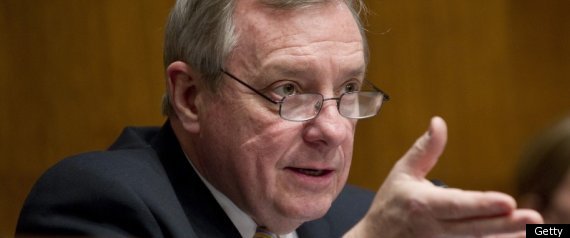
By Daniel Burke
Religion News Service
First Posted: 03/30/11 12:37 AM ET
Updated: 03/30/11 12:37 AM ET
Courtesy Of "The Huffington Post"
WASHINGTON -- It was billed as the first-ever congressional hearing on the civil rights of American Muslims. But it played more like an Act II than a premiere.
In many ways, the hearing led by Senate Democrats on Tuesday (March 29) was the dramatic antithesis of one House Republicans held earlier this month on homegrown Islamic radicalism.
Instead of gavel-banging, decorum prevailed. Sobering statistics stood in for emotional anecdotes, and laughter, not sobs, resounded in the committee room. While an audience packed the gallery, the dais was empty save for the six senators who came and went.
But the most striking change was the second hearing's focus: Crimes committed against American Muslims, not by them.
Sen. Dick Durbin, D-Ill., said he convened Tuesday's hearing because of rising Islamophobia, manifested by Quran burnings, hate speech and restrictions on mosque construction.
And though he did not mention him by name, Durbin twice criticized House Homeland Security Committee Chairman Peter King, R-N.Y., who convened the earlier hearing on the "radicalization" of American Muslims.
The premise of King's hearing was that American Muslims do not cooperate with law enforcement probes into violent members of their community.
"We should all agree that it is wrong to blame an entire community for the wrongdoing of a few," said Durbin. "Guilt by association is not the American way."
King told Fox News on Monday that Durbin's hearing "is somehow trying to create the illusion that there's a violation of civil rights of Muslims in this country. It's absolutely untrue, and to me it makes no sense."
Durbin, the chamber's No. 2 Democrat, wasted little time in rebutting King. "Some have even questioned the premise of today's hearing," he said in his opening remarks, "that we should protect the civil rights of American Muslims."
Durbin also criticized King's controversial statement that "there are too many mosques in this country."
"Such inflammatory speech from prominent public figures creates a fertile climate for discrimination," Durbin said.
Durbin's star witness was Thomas Perez, the Justice Department's assistant attorney general for civil rights. Since the terrorist attacks of 9/11, a "steady stream of violence and discrimination" has targeted Muslims, Arabs, Sikhs and South Asians in the United States, he said.
"In each city and town where I have met with leaders of these communities, I have been struck by the sense of fear that pervades their lives -- fear of violence, bigotry and hate," Perez said. "The headwind of intolerance manifests itself in many ways."
Perez noted that the Justice Department passed a grim milestone last month when it secured a guilty plea from a man who torched a playground at a Texas mosque: He was the 50th defendant charged in a federal criminal case of post-9/11 backlash.
Muslim complaints about workplace discrimination have increased 150 percent since 9/11, Perez said, but he and other witnesses seemed most upset by reports that many Muslim children are harassed at school -- called "terrorists" and told to "go home."
"We have a growing docket of cases involving Muslim, Arab, Sikh, and South Asian students," he said. Muslim students form the largest category of religious discrimination cases handled by the Department of Justice's education division, Perez added.
"Parents worry, `Will my child be next?"' said Farhana Khera, executive director of Muslim Advocates, who also testified on Tuesday. "And they worry about the future: Will America be hospitable to other faiths? Will its better angels prevail?"
Durbin drew a raucous laugh from Khera, a former Senate staffer, when he helped her recall the central tenets of Islam during an exchange about Shariah law. Durbin voiced doubt throughout the hearing that the Islamic law system, which offers guidance on subjects like charity and prayer, is a threat to American jurisprudence, as some conservatives warn.
Cardinal Theodore McCarrick, the former archbishop of Washington and an experienced diplomat, said Catholic bishops "stand with our Muslim brothers and sisters in defense of their dignity and rights." McCarrick demurred, however, when asked by Durbin to defend the rights of Muslims to build a mosque near Ground Zero in New York.
Senate Republicans, meanwhile, agreed that Muslims' rights should be protected but insisted that "there are two sides to this story."
"Efforts to recruit and radicalize young Muslims must be dealt with," said Sen. Lindsey Graham, R-S.C. "To the American Muslim community, I will stand with you, but you will have to help your country," he said. "Get in this fight and protect your young people and your nation from radicalization."
Sen. Jon Kyle, R-Ariz., warned: "The only way to stop terrorists is to recognize where they are coming from. Political correctness cannot stand in the way of identifying those who would do us harm."
Muslims who attended the hearing said it was a welcome change from the earlier House session.
"Both needed to be held, both had certain aspects to discuss," said Sayyid Syeed, who oversees interfaith programs for the Islamic Society of North America. "But the first hearing added to an atmosphere of witch-hunting and mistrust. This one was more positive."




No comments:
Post a Comment